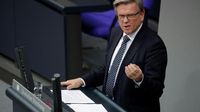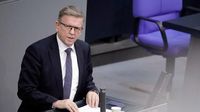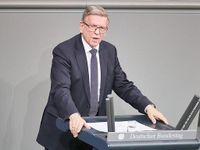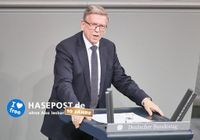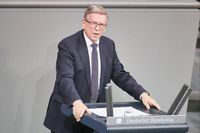Berlin – The Alternative for Germany (AfD) has officially nominated Gerold Otten as its candidate for the position of Bundestag Vice President, marking a significant moment for the party as it seeks to secure a key leadership role.
Stefan Keuter, the deputy AfD parliamentary group leader, announced the decision, stating, "Die Interessenten haben sich untereinander verständigt und auf Gerold Otten geeinigt" (The interested parties have agreed among themselves on Gerold Otten). The nomination comes as Otten, who has been a member of the Bundestag since 2017, prepares for a challenge that has eluded the AfD for years. The party has failed in its attempts to elect candidates for this vital post, with Otten being the latest in a long line of nominations.
Historically, the AfD has put forth candidates for the vice presidency 26 times since entering the Bundestag, but none have been successful. This includes Otten's previous candidacies, which were met with substantial opposition. His most recent attempt in January 2023 resulted in a mere 99 votes in favor, contrasted with 571 votes against him.
Yet, there appears to be a shift in dynamics. With the AfD now positioned as the second-largest party in the Bundestag, it will be increasingly challenging for the other factions to dismiss Otten’s candidacy outright. The meeting to discuss these nominations within the AfD will occur on Monday evening, March 24, 2025, where positions will be solidified among party members.
Otten's nomination stands out not only due to the current political climate but also because of his background. Born in Niedersachsen and a former Air Force officer, Otten brings military experience to the table, a characteristic that Keuter highlighted during the announcement. He referred to Otten as a "lang gedienter, guter Militär" (long-serving, good military man) and expressed confidence that he would garner support from fellow parliamentarians: "Ich gehe davon aus, dass Otten von der Fraktion gewählt werde" (I assume that Otten will be elected by the faction).
The internal selections within the AfD have seen five other members listed as potential candidates, including Malte Kaufmann, Michael Kaufmann, Jochen Haug, and Karsten Hilse. Keuter's remarks reflecting on Otten suggest a cooperative spirit among these candidates, as they agreed to put forth Otten's name to the parliamentary executive board, further enhancing his chances.
This is a crucial moment not just for Otten but for the entire AfD as it attempts to establish itself firmly in German politics. With the Bundestag set to convene officially just a day later, on March 25, 2025, the pressure mounts to determine whether the party can finally succeed in securing this prestigious office.
If the faction successfully votes for Otten, it could signify a new chapter for the AfD, one where they not only hold substantial representation but can also influence key decisions from within the Bundestag's leadership. Otten’s previous roles included participation in the Defense Committee, where he dealt with issues concerning disarmament and arms control, placing him in a noteworthy light regarding national security discussions.
As the constituents await the results from the AfD’s internal meeting, many are keenly watching how this nomination plays out, mindful of the historical context of the party's struggles and the current political landscape.
Will Gerold Otten break the cycle of rejection? Tomorrow’s decisions might just pave the way for a new approach within the Bundestag, not only for the AfD but for the future of political coalition-building in Germany.
